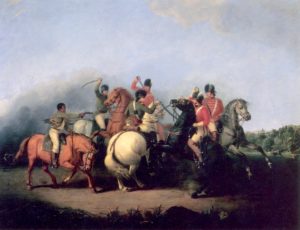October 16 — October 31, 2019
History Matters
Showing our children that their past is prelude to their future, with book recommendations
 The American Revolution essentially ended on October 19, 1781 when British General Charles Cornwallis surrendered his 8,000 British and Hessian troops to General George Washington in Yorktown, VA. Washington enveloped the general in Yorktown using American and French armies, and a large French fleet of warships to force the British to quit. Two years later, the Treaty of Paris was signed, and the hostilities in America were ended.
The American Revolution essentially ended on October 19, 1781 when British General Charles Cornwallis surrendered his 8,000 British and Hessian troops to General George Washington in Yorktown, VA. Washington enveloped the general in Yorktown using American and French armies, and a large French fleet of warships to force the British to quit. Two years later, the Treaty of Paris was signed, and the hostilities in America were ended.
For more information, the Grateful American Book Prize recommends Washington and Cornwallis: The Battle for America: 1775-1783 by Benton Rain Patterson.
****
 Thomas Edison lit the world when he invented the lightbulb October 21, 1879. On that day, he successfully tested his “electric incandescent lamp”—composed—in part—of a never-tested carbonized filament that remained aglow more than 14 hours. Inventors from around the world since 1835 had tried to successfully develop an electric light.
Thomas Edison lit the world when he invented the lightbulb October 21, 1879. On that day, he successfully tested his “electric incandescent lamp”—composed—in part—of a never-tested carbonized filament that remained aglow more than 14 hours. Inventors from around the world since 1835 had tried to successfully develop an electric light.
For more information, the Grateful American Book Prize recommends The Light Bulb by John Mathews.
****
 Panic selling overwhelmed the New York Stock Exchange on October 24, 1929, when traders dumped 13 million shares as stock prices began to tumble. Five days later—on “Black Tuesday” an additional 16 million shares were sold as prices continued to drop. These events were part of the reason for The Great Depression, which lasted until 1939.
Panic selling overwhelmed the New York Stock Exchange on October 24, 1929, when traders dumped 13 million shares as stock prices began to tumble. Five days later—on “Black Tuesday” an additional 16 million shares were sold as prices continued to drop. These events were part of the reason for The Great Depression, which lasted until 1939.
For more information, read Black Tuesday by Nomi Prins.
****
The Wild West lived up to its reputation in Tombstone, Arizona, on  October 26, 1881, when the Earp Brothers — Wyatt, Virgil and Morgan — and Doc Holliday– confronted the outlaw Clanton clan in the gunfight at the O.K. Corral—a near legendary, but true tale–about a critical time in the American history.
October 26, 1881, when the Earp Brothers — Wyatt, Virgil and Morgan — and Doc Holliday– confronted the outlaw Clanton clan in the gunfight at the O.K. Corral—a near legendary, but true tale–about a critical time in the American history.
Tombstone became a boomtown in 1877 after silver was discovered nearby; suddenly, miners seeking their fortunes were lured to the small community. Farmers and ranchers also saw an opening—and a market–for their produce and livestock, while criminals like the Clanton clan were on the lookout for Lady Luck to go their way. They rustled cattle, held up stagecoaches; maimed and murdered their victims. Tombstone had turned into one of the country’s richest mining towns, but the people finally had their fill of the bad guys and hired the Earps to keep the peace. The gunfight at the O.K. Corral was an example of America’s growing “pains.”
For further reading, the Grateful American Book Prize recommends The Last Gunfight: The Real Story of the Shootout at the O.K. Corral – And How It Changed the American West by Jeff Guinn.
****
 The Mount Rushmore National Memorial, located in the Black Hills of Keystone, South Dakota, is one of the most ambitious public works ever undertaken. It was the masterpiece of American artist and sculptor, Gutzon Borglum: 14 years in the making to complete the sixty-foot granite faces of Presidents Washington, Jefferson, Theodore Roosevelt, and Lincoln, Borglum died just before the end of the project, but his son, Lincoln, finished it on October 31, 1941.
The Mount Rushmore National Memorial, located in the Black Hills of Keystone, South Dakota, is one of the most ambitious public works ever undertaken. It was the masterpiece of American artist and sculptor, Gutzon Borglum: 14 years in the making to complete the sixty-foot granite faces of Presidents Washington, Jefferson, Theodore Roosevelt, and Lincoln, Borglum died just before the end of the project, but his son, Lincoln, finished it on October 31, 1941.
The Carving of Mount Rushmore by Rex Alan Smith is all about a truly “monumental” accomplishment that is a lesson in patriotism.
History Matters is a biweekly feature courtesy of The Grateful American Book Prize.




